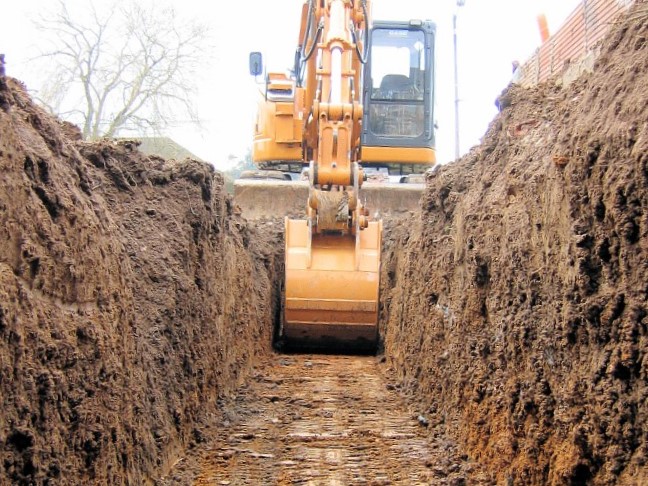Budget Friendly Lancaster Excavation - Quality Excavation at Competitive Prices
Budget Friendly Lancaster Excavation - Quality Excavation at Competitive Prices
Blog Article
Comprehensive Excavation Strategies: Understanding the Principles for Success
The cautious planning, accurate implementation, and thorough interest to detail required in excavation jobs demand a detailed strategy that encompasses various fundamental facets. The true proficiency exists not just in recognizing these basics yet in perfectly integrating them to browse the intricacies of excavation tasks with finesse.
Comprehending Excavation Task Preparation

Effective excavation jobs are built on the foundation of complete and thorough preparation. The initial phase of any excavation project is the drawing board, where essential decisions are made that can significantly influence the outcome of the task. During this phase, it is vital to gather all relevant info concerning the website, including topographical studies, soil make-up, and any type of potential dangers that might exist. Comprehending the project budget plan, extent, and timeline constraints is important for producing a comprehensive excavation strategy that makes sure the job's success.
One secret aspect of excavation project preparation is the growth of a comprehensive timeline that outlines the series of tasks, target dates, and turning points. This timeline functions as a roadmap for the task group, permitting them to track development and make needed changes to ensure the project stays on schedule. Furthermore, a distinct budget plan that accounts for all expenses, consisting of tools leasing, labor prices, and materials, is important for staying clear of price overruns and delays. By carefully taking into consideration all these elements during the planning stage, excavation jobs can be carried out successfully and properly, resulting in effective results.
Dirt Evaluation and Site Analysis
Carrying out extensive dirt evaluation and site assessment is a critical action in the prep work phase of any type of excavation task. Dirt analysis involves establishing the make-up, structure, and properties of the dirt at the excavation website. This details is essential for recognizing the soil's bearing ability, moisture content, and potential for disintegration, which are key consider determining the excavation approaches and tools needed for the task.
Site analysis goes beyond soil evaluation and incorporates a broader assessment of the general site conditions. This evaluation includes identifying any potential dangers, such as below ground utilities, environmental concerns, or unsteady terrain, that can impact the excavation process. By completely evaluating the website, project managers can develop reliable excavation strategies that focus on security, performance, and ecological protection.
Utilizing advanced innovations like ground-penetrating radar, dirt sampling, and drone studies can improve the accuracy and effectiveness of dirt evaluation and website evaluation. Spending time and sources in these initial steps can eventually save time and avoid pricey hold-ups or problems throughout the excavation procedure.
Equipment Option and Utilization
Efficient excavation projects depend heavily on tactical tools option and utilization to ensure ideal performance and efficiency. Selecting the ideal tools for the task is important in making best use of performance and minimizing downtime. Factors such as the kind of dirt, depth of excavation, and job scope play a considerable function in establishing the most appropriate equipment for the task available.

Along with choosing the ideal devices, proper use is key to job success. Operators has to be educated to handle the tools securely and efficiently - dump truck companies in ohio. Regular maintenance checks and timely repair services help protect against malfunctions and make sure consistent efficiency throughout the project
Precaution and Regulations Conformity
In the realm of excavation projects, prioritizing safety and security actions and compliance with policies is critical to making certain a legitimately audio and safe and secure operational environment. Precaution include an find more information array of practices, consisting of carrying out extensive website assessments, applying proper signage and barriers, and giving appropriate security training for all personnel associated with the excavation process. Adherence to guidelines, such as OSHA demands in the USA, makes certain that the excavation job satisfies the required criteria to shield workers, onlookers, and the surrounding environment.

Surveillance Development and Adjusting Techniques
Just how can forecast supervisors properly track the improvement of excavation tasks and adjust their techniques appropriately to optimize results? Monitoring progression is important for making sure that excavation tasks stay on track published here and fulfill deadlines.
Verdict
In final thought, grasping the principles of comprehensive excavation strategies is necessary for the success of any type of project. By recognizing project planning, analyzing dirt and website conditions, picking ideal devices, adhering to security laws, and monitoring development, project managers can guarantee a effective and smooth excavation procedure. Executing these techniques will certainly result in successful outcomes and lessen over here prospective dangers or problems during the excavation task.
The initial phase of any kind of excavation project is the planning stage, where important choices are made that can considerably affect the result of the job. Recognizing the task timeline, scope, and budget restrictions is critical for developing a thorough excavation strategy that makes certain the task's success.
Exactly how can project managers successfully track the improvement of excavation tasks and adjust their methods appropriately to maximize outcomes? By very closely checking development and being willing to adjust methods, job managers can boost the overall success of excavation jobs.
By understanding task planning, examining soil and website problems, choosing proper tools, conforming with safety and security policies, and checking progression, project supervisors can ensure a smooth and effective excavation procedure.
Report this page